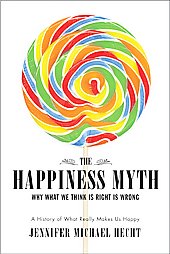The Happiness Myth: A History of What Really Makes Us Happy
Posted in Book Reviews on January 15th, 2013by Elizabeth
Tags: Book Reviews • History
Right now, we know more about our universe than ever before. But as we advance in knowledge, are we advancing in happiness? Jennifer Michael Hecht explores the idea of happiness from a historical and philosophical perspective in The Happiness Myth. The book challenges popular notions about what should make us happy.
Hecht explains about how ideas about happiness have changed over time, and how even though we might be living longer and having more material wealth than ever before people report that they are basically as happy as they were in 1950. After a basic overview on happiness advice throughout the ages, she explores ideas about drugs, money, our bodies, and celebrations and what they meant to different people in different times and places and explains how we might use this knowledge to make ourselves happier today. Often this is a matter of reconsidering notions that “everyone knows” to be true. For example, in the past, people spoke rapturously of how tea or coffee made them feel. Today, we value these beverages first and foremost for the way they increase our productivity. Or, that women used or wear restrictive corsets or girdles to achieve an hourglass figure. Now, women are expected to look just as shapely through diet and exercise alone. I was especially fascinated by the descriptions of the Greek Festivals and how they might compare to today’s parades and holidays.
One of the things I liked about this book was how it challenged a lot of assumptions I hold that I haven’t given much thought to. And every time it happened, I was more amused to consider why I thought what I thought instead of feeling defensive or sheepish.
The Happiness Myth drives home the point that “there is nothing new under the sun,” but instead of using it as an admonishment, it’s meant to provide comfort and guidance for the future.
Hecht encourages us to get out and see for ourselves if what our culture is telling us really true, or if people from the past might have had a better idea on how to be happy. The book isn’t an argument for a return to any bygone era but rather a critical examination of current assumptions with a little help from those who came before us.


